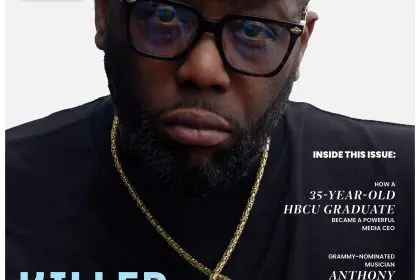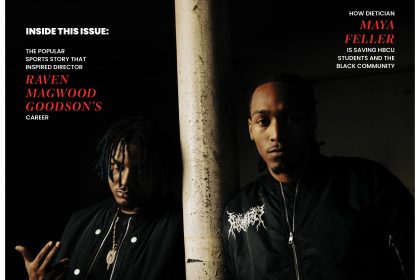One person stands out at the top of his list of musical influences as an example of music that never dies.
“Donny Hathaway’s at the top of my list, mostly because I’ve learned a lot from [him]. I personally appointed him my music director from heaven,” he says.
“I learned a lot in the way of songwriting, musical arrangement, note appreciation, how to get the most out of my tone, how to pace myself in a song, how to put real passion and emotion [into it], and how to really articulate what I’m really feeling, you know? All of the elements or the recipe that someone who considers themselves a connoisseur of soul music would consider necessary — if I have them, I got most of it from Donny Hathaway, Marvin Gaye and Stevie Wonder. And luckily, Stevie Wonder is still with us, so I’m going to do my best to try to work with him. We’ve got to do better at appreciating the people who mean the most to us while they’re here — so Stevie, what’s good, man? Let’s work!”
The relationship that those artists had with the community, and their ability to articulate through sound what many were feeling at a particular time, that type of connection can only be described as soul music. But, in Musiq’s opinion, soul music can’t be relegated to one genre.
“I think that R&B music came from the concept of soul music. Soul music isn’t something that you can really compartmentalize to any genre. You can be soulful with anything,” he says.
Still, the black community has a unique relationship with what is known as soul music, and Musiq feels it is a history that should never be forgotten.
“I think, musically speaking, the African American community is defined, in a lot of ways, by the culture of soul music. It was the soundtrack to our legacy. It is the soundtrack to our legacy. It’s important that we uphold that because, years from now, when people want to do their homework on the timeline of the African American experience, music is a great communicator. It’s a great way of archiving moments in time, and moments in life, in however many ways. It’s not always happy. It’s not always sad. It’s not always melancholy. It’s not always joyful. It runs the whole spectrum, and you’ve got to take it for whatever it is — the good, the bad, the ugly or otherwise. I think that soul music is extremely important to the African American community. Right up there with gospel music, blues music and jazz music. They all stem from the same source,” he says.
With music’s ability to connect and communicate clearly evident, it was only natural to query Musiq about the healing power of music, particularly as it pertains to depression in the African American community. His answer was consistent with who is.
“I think depression is a representation of a lack of love, a lack of compassion, a lack of consideration, and a lack of sensitivity, personified through a person’s point of view. It’s not to say that, it’s a good thing or a bad thing, it just is what it is. Everything is a reaction, or a response, to something that’s happening.
“For instance, if you get sick, that sickness is a symptom; it’s a representation of something that’s not going right within in your body. I think that emotionally, depression is a representation of something that is lacking in a person’s life emotionally. We could speak about bio-chemistry and the imbalance and how all that plays into that, but I think that there isn’t anything in human existence or in the human experience that cannot be fixed, or remedied, in any variation, with love,” Musiq says.
“Love can be used as medicine. As long as someone is willing to do the work,” he says. “Just like if you’re dehydrated, you need water. If you’re sick emotionally, I promise you, to some degree or another, love is the cure.”
As the headline performer at this year’s 25th annual African Festival of the Arts, Musiq was proud to spread the love inherent in African and African American culture, throughout the city of Chicago, and beyond.
“I think that African culture is the birthplace of African American music. It went through different transitions, through generations and generations — it’s not some information that was passed on from country to country. We were the carriers of that information when we were brought over. We get it honestly. We’re just inherently creative geniuses. However that sounds to whoever’s watching or reading, I really live by that fact. We were just born with these abilities of creativity, and music is a great representation of that,” he says.
For his part, Musiq is a great representation of us all.
To learn more about the African Festival of the Arts, visit www.africanfestivalchicago.com.
Story by T.J. Crawford
Photographer: Brandon Wiggins
Makeup artist: Michelle Carr
Videographer: Brian Wynder
Producer: Munson Steed
Co-Producer: Jay Weese
Location: POP ATL, 675 Metropolitan Ave., Suite 4217

















